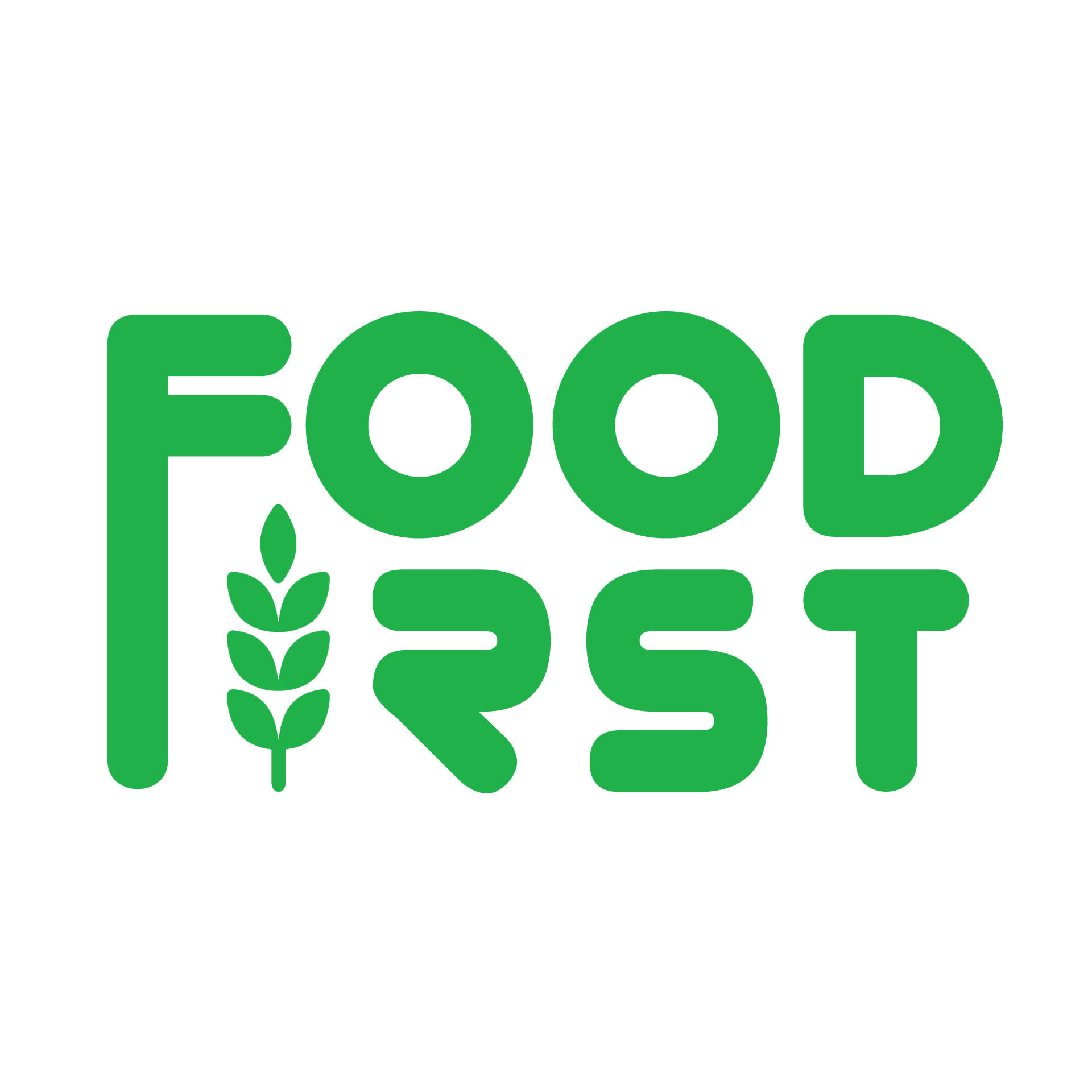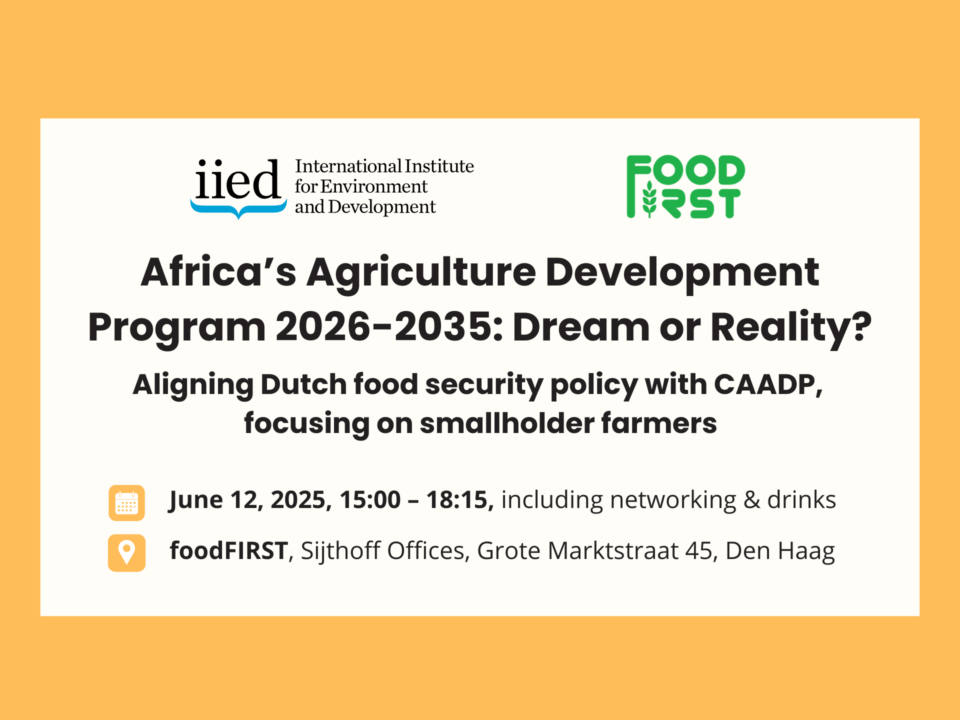Walking the talk:
the global and Dutch response to Africa’s food systems challenges.
How to walk the talk in accelerating food systems transformation? During the first of a two-part Vijverberg Session series, 60 stakeholders came together on March 29th 2023, to jointly sharpen their perspectives: how can the global and the Dutch community of knowledge institutions, private sector, banks, civil society and government, effectively contribute to this transformation? The session, that was organised in collaboration with the Netherlands Food Partnership (NFP) focused particularly on Africa, where the global and Dutch response needs to link with and strengthen local ambitions, actions, and agents of change supporting transforming food systems.
What happened after the UN Food Systems Summit (UNFSS)?
Coordinator of the UN Food Systems Coordination Hub, Stefanos Fotiou kicked off with the latest expectations of the upcoming global Stocktaking Moment (Rome, July 2023). Access his presentation here.
Since September 2021, a lot of positive dynamics have been observed. Almost two dozen countries have started concrete actions to implement their national pathways, which is the most important element of the follow-up to the Food Systems Summit. Good examples are Bhutan, Indonesia, Kenya, Lesotho, Nepal, Nigeria and Serbia. Many (other) African countries also serve as an example globally in implementing national pathways. Moreover, Africa was the only continent to come up with a common position and follow-up. At the same time, in most of the 100 UN member states, which developed a national pathway in 2021, the implementation is yet to come. Much more support is needed to ensure that the plans actually lead to the transformation of food systems.
Countries use a variety of approaches, there is not one recipe. With the national pathways, each country has defined an extensive menu of options to operationalise and implement food systems transformation. Country level platforms are in the lead. An important trend among African countries is the integration of national pathways into national strategy plans, for instance by ensuring budgets for operationalisation. Important issues addressed in several countries are food waste; the true cost of food; healthy diets; while countries use science, technology and innovation in solving these issues and work on the localisation of pathways. Countries’ successes, challenges and lessons will be shared at the Stocktacking Moment.
Ecosystem of support
The country-level efforts are supported by amongst others the UN Food Systems Coordination Hub in Rome. In addition, they receive various types of support from the global Coalitions that were created in the run up to the UNFSS, from the Science community, as well as from other stakeholders and alliances. This network of formal and less formal actors is gradually evolving, and jointly they form an ‘ecosystem of support’ for the national pathways. The need for such a supportive ecosystem stems from the idea that the international community must support nationally led mechanisms. Going beyond the UN system, it enables and encourages all relevant stakeholders, including international financial institutions, the private sector and civil society to play a pivotal role in supporting country implementation.
The Stocktaking Moment this summer in Rome is a key proving moment. It will be a crucial moment to address how to finance the institutions, people and organisations that will be working to transform food systems. Permanent Representative of the Netherlands to the UN Organisations in Rome, Marcel Beukeboom: “The Stocktaking Moment should also develop a set of metrics for success, clarifying when incentives are working in the right transition direction.” To do so a good analysis is needed of why interventions were successful and why others failed. Lia van Weesenbeeck, director of the Amsterdam Centre for World Food Studies, observed that it is also important to do a good context analysis, understanding the environment, and understanding the stakeholder landscape: who needs to act, or who can act?
The international community may also need to face some resistance to the ‘food systems’ agenda at the Stocktaking Moment. The global conversation on food systems transitions is characterised by a multifaceted political economy and a multilateral reality; a reality that we need to be aware of and operate in carefully. In this context, some may refer to the too complex nature of the food systems discourse, an argument about which a participant said: “Complexity is not an excuse, try to always push back when someone comes back with this argument”. The political ambition should be to get a group of countries that genuinely wants to make the Food Systems Summit implementation a success.
The Netherlands as frontrunner?
The meeting explored the Dutch role in the follow up to the Food Systems Summit, and particularly its response to Africa's food system challenges in policy making and practice. First of all, participants agreed that some modesty is justified when Dutch actors talk about food systems transformation in Africa. It was said that “we [the Netherlands] are in no position to lecture anyone on their own food systems transformation”. The Netherlands is itself in the midst of navigating the complex political economy of transforming the way food is produced, processed and consumed. According to another participant, the Netherlands may learn from African countries how to make the food systems agenda an entry point for a broader sustainable development strategy. For example, encourage that debates about food systems transition go beyond the policy boundaries of the Ministry of Agriculture, Nature and Food Quality.
Secondly, participants noted that recognising the value of collaborating with stakeholders of different sectors and transcending one’s boundaries is an important step to take. Yet, also in the Netherlands, it seems that not all players want to walk in the same direction when it comes to food system transformation; even while the Netherlands is a promoter of multi-stakeholder collaboration (the ‘Dutch Diamond’ approach) in its international diplomacy. Domestically, competing claims and differing visions have emerged, making it challenging for the Dutch government to fully implement its goals and effectively transform its own food system. This resistance within society and amongst policymakers has made it increasingly difficult for the Dutch government to walk the talk in transforming its own food system. A challenge that is not unique to the Netherlands, as explained above.
Towards concrete action
“Africa is thirsty for technology and investments,” said Stefanos Fotiou, who clearly sees a role for the Netherlands to help make the case of what successful food systems transformation means, and inspire other countries. The conversation continued, identifying opportunities for concrete measures of Dutch actors to support the national pathways of African countries. This converged around three issues: learning from transformation efforts in other sectors, fostering local solutions, and being a partner in multi stakeholder collaboration.
For Dutch actors, there could be opportunities to jointly define long-term efforts and strategies in food systems transformation. Experience shows that partners in the water sector more readily commit to long-term joint efforts and strategies. The agrifood sector can learn from this, for example that a long-term vision can serve as a basis for coherence in policies and goals, and can help unite stakeholders around a common objective that helps align short-term actions. Not unlike the effort of the national pathways for food systems transitions.
A long-term vision could also help boost investment in food systems transformation. Due to the proven market value of investment in the water sector, that sector has been able to attract significant investment. For food systems transformation, getting such proof is not easy, “because we cannot rely on the traditional economic approach to financial flows to prove that investment in food systems is making good market sense”.
This relates to a key challenge in food systems transformation: to go beyond monetary value and also consider environmental and social costs. In other words, looking into the true cost, true value and true price of food. Such an approach is more holistic - considering the broader environmental, social and economic impacts of food production, distribution and consumption and factoring this into the cost of production. This includes factors such as environmental sustainability, social equity and health outcomes, which are often not fully considered in traditional economic models.
The potential of local solutions
A second angle is the opportunity for Dutch actors to support processes to radically redirect agricultural subsidies and policies towards embracing and integrating local and context-specific solutions. In Senegal and Burkina Faso, for example, national governments have increased investment in their domestic production sectors. In Senegal, millet is being rediscovered as an alternative to wheat and bakeries are now using locally available and locally adapted grains.
Producing for global markets is not necessarily the solution for local food security: “Africa will need to become more self-sufficient and increase regional trade”. Internationally, there is a growing recognition that agricultural policies and subsidies often favour large-scale industrial agriculture, which can have detrimental impacts on the social, environmental, and health aspects of food systems. Redirecting subsidies towards more sustainable, inclusive, and locally relevant solutions is gaining traction as a way to address these challenges and transform food systems.
Working together in multi-stakeholder partnerships
Dutch actors may be valuable partners in national food systems transformation in Africa through multi-stakeholder cooperation. However, the challenge of initiating or expanding collaborations with Dutch actors remained the "million-dollar question" at hand. What are the concrete next steps? One approach suggested was to guide countries in showcasing the added value of adopting a multi-stakeholder approach. This would involve empowering local networks of stakeholders, identifying those who can drive change, and finding ways to include them in decision-making processes.
Moderator Lia van Weesenbeeck concluded by observing “there is plenty of interest amongst the different stakeholders present today to offer support”. The next step is to connect to the national pathways, collaborate with the national food systems convenors, and to connect to the local ambitions, actions and agents for change. Important success factors highlighted today are having a clear long-term vision, collaborating with various stakeholders, and being aware of the resistance in the multilateral reality. Both in international collaboration, and in the Netherlands, there is plenty of opportunity to start walking the talk!
What next?
-
- June 2023. Information session on the UN FSS Stocktaking Moment for Dutch network partners, with the UN FSS Coordination hub. During this session, we will discuss how to best prepare for the UN FSS Stocktaking moment. We will aim to assess what transformative, innovative and scalable approaches the Dutch knowledge base could bring to this event in order to better respond to the needs and knowledge gaps expressed by the African countries in their national pathways.
- 24-26 July 2023 UN FSS Stocktaking moment (See https://www.unfoodsystemshub.org/fs-stocktaking-moment/programme/en )
- Oct-Nov 2023. The role of the science-policy interface in food systems transformation, with FAO Chief Scientist Ismahane Elouafi. In this session, we will discuss how the science-policy-practice interface can improve the delivery of development results on the ground and how the Dutch innovative knowledge base could better respond to the scientific needs of African countries.
About the Vijverberg sessions on Food Systems Transformation
The objective of the series is to deepen our understanding of the main drivers for FST and share views and experiences on the implementation of FST, amongst others via the national pathways. Many organisations embraced FST as their purpose but putting FST into practice by effective implementation strategies proves to be a huge challenge. The series aims to sharpen the perspective on how the traditionally strong Dutch knowledge base on food and agriculture and the Dutch diamond—government, private sector, banks, NGO’s, knowledge institutes and other practitioners—can effectively contribute to the new transformation agenda, in particular in Africa. The second session will focus on the role of the science-policy-practice interface, for which FAO Chief Scientist, Ismahane Elouafi, has been invited.

